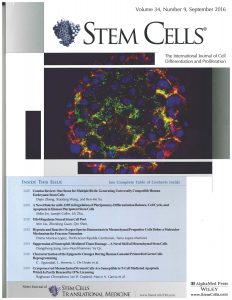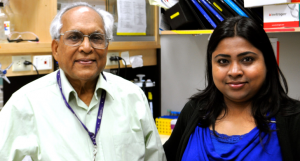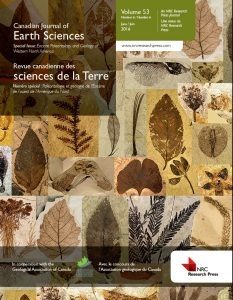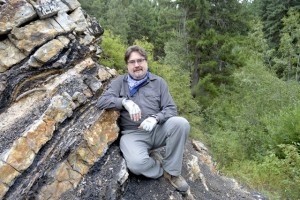Announcements
Targeting Breast Cancer Stem Cells to Reduce Cancer Progression
 A recent article published by Dr. Mousumi Majumder in the area of Cancer Stem Cell, was selected for the cover of the highly reputed journal “Stem Cells”, Wiley, AlphaMed Publishing group. Dr. Majumder is an assistant professor at the department of Biology at Brandon University. She conducted this research during her Postdoctoral tenure at the University of Western Ontario (UWO) in Prof. Peeyush K Lala’s laboratory. The article was accepted in June of 2016 and the printed version was available only recently in the September issue, Volume 34, Issue 9. The cover page showing the confocal image of a tumor spheroid grown in a Petri dish from a single cell, this is an assay to measure stem cell property of the cell. Over expression of an inflammatory gene COX-2, induces the stem cell property of the breast cancer cell. As shown by immunofluorescence staining of the spheroid for stem cell marker β-Catenin (red), COX-2 (green) and co-localization of both markers shown in yellow, cell Nuclei were stained with DAPI in blue. The online version of the article can be found at https://www.ncbi.nlm.nih.gov/pubmed/27301070.
A recent article published by Dr. Mousumi Majumder in the area of Cancer Stem Cell, was selected for the cover of the highly reputed journal “Stem Cells”, Wiley, AlphaMed Publishing group. Dr. Majumder is an assistant professor at the department of Biology at Brandon University. She conducted this research during her Postdoctoral tenure at the University of Western Ontario (UWO) in Prof. Peeyush K Lala’s laboratory. The article was accepted in June of 2016 and the printed version was available only recently in the September issue, Volume 34, Issue 9. The cover page showing the confocal image of a tumor spheroid grown in a Petri dish from a single cell, this is an assay to measure stem cell property of the cell. Over expression of an inflammatory gene COX-2, induces the stem cell property of the breast cancer cell. As shown by immunofluorescence staining of the spheroid for stem cell marker β-Catenin (red), COX-2 (green) and co-localization of both markers shown in yellow, cell Nuclei were stained with DAPI in blue. The online version of the article can be found at https://www.ncbi.nlm.nih.gov/pubmed/27301070.
Dr. Terence McGonigle awarded grant from Environment Canada
Dr. McGonigle has been awarded a grant for two-years at $22,500 per year from Environment Canada for a project entitled “Evaluation of return of wetland function following restoration using drain plugs on prairie potholes.” Total project value is $45,000.
Team takes aim at enzyme that causes breast cancer to grow, spread and recur
 Researchers at Western University in London Ontario are zeroing in on a way to shut down over-production of a well-known enzyme that causes breast cancer tumours to grow, spread and — even after treatment — return.
Researchers at Western University in London Ontario are zeroing in on a way to shut down over-production of a well-known enzyme that causes breast cancer tumours to grow, spread and — even after treatment — return.
“This is the result of 10 years of research,” says Dr. Peeyush Lala, Professor-Emeritus (active) and Past Chair of the Oncology Department at Western’s Schulich School of Medicine and Dentistry.
The findings were published in the journal Stem Cells with Dr. Mousumi Majumder, pictured here with Dr. Lala, as lead author.
The COX-2 enzyme is important to good health but best known for its role in inflammation — particularly among people who suffer from arthritis. Drugs like aspirin or ibuprofen that act as COX-2 inhibitors can relieve the inflammation and ease the pain.
Bacterial infection can lead to high levels of COX-2, which in turn stimulates over-production of the small molecule prostaglandin E2. PGE2 then kindles construction of cancer-like stem cells that cause tumours to thrive, metastasize and recur — because chemo and radiation therapies can’t kill them.
Dr. Lala’s lab found that a particular PGE2 receptor known as EP4 is the culprit causing this cascade toward breast cancer. Their findings suggest that using EP4 antagonists will reduce production of these cancer-like stem cells.
Dr. Lala is collaborating with two drug companies to develop EP4 antagonists to block cancer-like stem cell activity without limiting the important roles that COX-2 plays in the body. One of the companies is currently testing a candidate drug in clinical trials as an arthritis treatment.
“It holds apromise. So we are planning to use the drug in human breast cancer patients as a second line of therapy,” says Dr. Lala. “It’s a couple of years away, but we are hopeful.”
Eocene Paleontology and Geology of western North America
 “Hot off the presses, Biology Dept. Prof, Dr. David Greenwood was co-editor with 2 colleagues from the US of a special issue of the Canadian Journal of Earth Sciences titled ‘Eocene paleontology and geology of western North America’. The special issue is now out in paper format and was online from April. The cover of the print version features a montage of fossils collected from sites from the Eocene geological Epoch from British Columbia being studied by Dr. Greenwood and his graduate students. The montage was prepared by Dr. Greenwood’s co-editor, Dr. Kathleen Pigg at Arizona State University. One of the papers in the special issue is based on the Honours project completed by a BU Biology alumnus, Cale Gushulak, who’s currently a Masters student at the University of Western Ontario. The online version of the special issue can be found here http://www.nrcresearchpress.com/toc/cjes/53/6 ”
“Hot off the presses, Biology Dept. Prof, Dr. David Greenwood was co-editor with 2 colleagues from the US of a special issue of the Canadian Journal of Earth Sciences titled ‘Eocene paleontology and geology of western North America’. The special issue is now out in paper format and was online from April. The cover of the print version features a montage of fossils collected from sites from the Eocene geological Epoch from British Columbia being studied by Dr. Greenwood and his graduate students. The montage was prepared by Dr. Greenwood’s co-editor, Dr. Kathleen Pigg at Arizona State University. One of the papers in the special issue is based on the Honours project completed by a BU Biology alumnus, Cale Gushulak, who’s currently a Masters student at the University of Western Ontario. The online version of the special issue can be found here http://www.nrcresearchpress.com/toc/cjes/53/6 ”
NSERC Success
BU researchers secure unprecedented fivefold increase in federal Discovery Grants
BRANDON, Man. – Cutting-edge research at Brandon University (BU) has received a huge boost, with the announcement of five new Discovery Grants, worth a total of $660,000 over five years, awarded to members of the Faculty of Science.
The grants, awarded by the Natural Sciences and Engineering Research Council of Canada (NSERC), bring the number of Discovery Grant projects led by BU researchers to 9. In each of the previous four years, one member of the Faculty of Science has been awarded a Discovery Grant.
“This increase in the number of NSERC funded research projects in science is unprecedented and historic for BU,” said Dr. Austin Gulliver, Dean of Science. “It is a tremendous accomplishment for any small university and reflects the superb research being conducted here. Our Faculty of Science and our entire University community can take enormous pride in this success.”
New Discovery Grant recipients include Dr. Bryan Cassone, Dr. David Greenwood and Dr. Christophe LeMoine from the Department of Biology as well as Dr. Eric Bushnell and Dr. Michael Charette from the Department of Chemistry.
“These NSERC funds will allow us to hire summer undergraduate students and graduate students and provide them with a world-class experience in research,” said Dr. Charette. “While the funding improves our ability to conduct research, it is that ability to hire students and give them that unique research exposure that is truly a game-changer.”
Their research projects will advance knowledge in varied areas, such as Eocene ecosystems, virus transmission, molecular chemistry and genetic function.
“It is excellent that a remarkable number of BU researchers have been recognized for their outstanding contributions to the field of science in Canada,” said Dr. Heather Duncan, Associate Vice-President (Research). “Their efforts will advance Brandon and Manitoba as a centre of research excellence, which will benefit our retention of talent, attraction of investment and create opportunities in the province.”
Other BU faculty having their research supported by ongoing Discovery Grants awarded in previous years are Dr. Bernadette Ardelli (Biology, year 2 of 5), Dr. Sarah Plosker (Mathematics and Computer Science, year 3 of 5), Dr. Wendy Untereiner (Biology, year 4 of 5) and Dr. Meg Carrington (Physics, year 5 of 5).
“It’s thrilling to have such a diverse set of scholars representing Brandon University with excellent research in so many different areas,” said Dr. Steven Robinson, Vice-President (Academic & Provost). “One of the real advantages of a close-knit university like BU is the ability to rub shoulders with researchers in different fields. There are so many great opportunities here for sharing between our faculty and with our students.”
Discovery Grants, which are typically awarded for a period of five years, support long-term projects in the natural sciences and engineering at Canadian universities.
| For more information: | |
|
Rob Henderson Marketing Communications Officer 204.727.9762 |
Grant Hamilton Marketing Communications Officer 204.571.8542 |
Biology Student Success
Admission to University of Manitoba
Ms. Payton Fines – Masters of Physician Assistant Studies, Faculty of Health Sciences, College of Medicine
Ms. Amber Hiebert – Masters of Biology
Admission to the Western College of Veterinary Medicine
Mr. Grayson Ross
Mr. Sheldon Cousins
Admission to Arcadia University
Ms. Juli Van Santen – Masters in Public Health and Masters of Physician Assistant Studies
Admission to Red River College
Ms. Brooke Hall – Medical Radiology Technology Program
Mr. Mitchell Whittington – Medical Laboratory Technologist Program
Admission to St. Martinus University
Mr. Jordan Cockerill – Faculty of Medicine
Ms. Alana Hutcheson – Faculty of Medicine
Ms. Kayla Oh – Faculty of Medicine
Dr. Bryan Cassone awarded Grant from Manitoba Pulse & Soybean Growers
Dr. Bryan Cassone from the Department of Biology has been awarded a three-year, $112,509.00 grant from Manitoba Pulse & Soybean Growers. The researchers will carry out the most comprehensive survey to date of foliar diseases in Manitoban soybean. The study will integrate field work and cutting-edge molecular tools to identify and characterize pathogens of emerging diseases that put future soybean yields at risk.
Soybean production in Manitoba has exploded over the past 10 years, which places an emphasis on developing comprehensive surveillance approaches for early detection of emerging foliar diseases. Current methods for disease surveillance are mostly limited to validating existing diseases. Not only will we detect pathogens not previously reported in Manitoba, we will also generate data that is critical for developing predictive models for improving crop production.
Brandon University professor to discuss his research at renowned Royal Tyrrell Museum of Paleontology

Dr. David Greenwood, poses at the Princeton Chert fossil locality, near Princeton, B.C., in august 2015.
A Brandon University (BU) professor is thrilled to be giving a talk this month at the world-renowned Royal Tyrrell Museum of Paleontology in Drumheller, Alta.
“It is a real honour to be a part of the Royal Tyrrell Museum’s 2016 Speaker Series, along with so many impressive paleontologists from across the continent and around the world,” said BU Biology Professor Dr. David Greenwood. “This is an opportunity to share some of the exciting and important research being done at Brandon University with a world-wide audience who are interested in current research and hot topics in palaeontology.”
Dr. Greenwood is well-known for his ongoing research on the fossil plants of the Eocene Epoch, a time about 50 million years ago when the world was so warm, great forests and diverse animals including alligators lived in the Canadian Arctic. His research has wide applications for scientists and Canadians who are working to understand how modern-day climate change will affect plant and animal life.
Every summer during his time at BU, Dr. Greenwood and his students have been visiting fossil sites in British Columbia looking for plant, insect and mammal fossils — yielding several impressive discoveries. This past summer, the expedition yielded boxes and boxes of plant fossils along with some superb insect fossils, including a large saw fly. Previous expeditions have been funded by the Natural Sciences and Engineering Research Council (NSERC), as well as the Brandon University Research Committee. He currently holds an expedition grant for field work in British Columbia from the U.S. based National Geographic Society Committee for Research and Exploration.
An overview of his ongoing research, including the most-recent expedition, will be discussed during Dr. Greenwood’s talk in Drumheller on Thursday, Feb. 18. There is no admission charge for the public to attend, and for those who can’t make it, the Royal Tyrrell Museum will also post a video of the talk to YouTube.
Westman residents will have an opportunity to hear Dr. Greenwood a little closer to home this month. He’ll also be discussing his research on Friday, Feb. 26 in an afternoon talk that is part of the BU Science Seminar Series. The public is welcome to attend the talk, scheduled for 3–4 p.m. in Room 4-47 of the Brodie Building on the BU campus.
Dr. Bernadette Ardelli awarded NSERC Discovery Grant
Dr. Bernadette Ardelli has been awarded an NSERC (Natural Sciences and Engineering Research Council of Canada) Discovery Grant. The grant is worth $150,000 spread across five years. Dr. Ardelli’s project is entitled, Characterization and role of the Drug / Metabolite Transporter (DMT) superfamily in drug resistance using a bodonid kinetoplastid model’.
National Geographic Society Funds BU Researcher’s Fieldwork
BRANDON, MB – A Brandon University (BU) researcher with an international reputation reconstructing the ancient world from plant fossils is returning to the field this summer thanks to support from the National Geographic Society. Dr. David Greenwood, a Professor of Environmental Science in BU’s Department of Biology, has been awarded US$14,483 by the Society’s Committee for Research and Exploration to cover costs of an expedition to southern British Columbia this summer.
Dr. Greenwood will travel to the McAbee fossil beds near Kamloops, B.C. from July 27 to August 3, and to areas around Princeton, B.C. from August 3 to 7. “We will find fossils,” says Dr. Greenwood, a plant biologist who will be joined by mammal fossil expert Dr. Jaelyn Eberle from the University of Colorado and fossil insect expert Dr. Bruce Archibald from Simon Fraser University. “We’re guaranteed to come back with box-loads of plant fossils, and the team is excited about the potential of finding mammal fossils as well.”
On previous field expeditions within northern B.C. at Driftwood Canyon, Dr. Greenwood and his students discovered fossils of a previously undiscovered tapir relative that was about the size of a large dog, as well as fossils of an ancient hedgehog that would have been smaller than a mouse. Both animals thrived in the lush, sub-tropical environment that spanned Canada during the height of a period of global warming 52 million years ago during the Eocene Epoch. Dr. Greenwood plans to return to Driftwood Canyon this fall.
During this fieldwork, BU undergraduate and graduate students from other universities will accompany Dr. Greenwood as field assistants. “I am very glad to have this opportunity to go to British Columbia this summer for the fieldwork project,” says Markus Sudermann, a BU Bachelor of Science student majoring in Geology who is about to begin his final year of studies. “I have always been very interested in this field, and now I have the chance to gain some first-hand experience, which will be of great value in my future – both here at BU for my final year of classes, and also on the job soon after.”
Other sites to be explored on this trip have yielded Eocene Epoch mammal fossils during digs in the 1920s, 1930s and 1960s, but have since been virtually untouched by researchers. The National Geographic Society funds fossil explorers around the world, and Dr. Greenwood’s fieldwork and discoveries in this area will be profiled on their website, www.nationalgeographic.com/explorers.
“David Greenwood’s project is of great interest to National Geographic because it has the potential to increase our understanding of middle-high latitude forests at a time of global warming,” said Dr. John Francis, vice president of Research, Conservation and Exploration at the National Geographic Society. “Reconstructing ecosystems of the past, including high-quality fossils of plants and insects, will help us understand how biodiversity is affected by climate change.”
Brandon University, founded in 1899, promotes excellence in teaching, research, and scholarship, and educates students so that they can make a meaningful difference as engaged citizens and leaders.
Operation of the Western-Based Mosquito Identification Facility
Manitoba Health, Healthy Living and Seniors (MHHLS) operates an adult mosquito surveillance network as part of its annual West Nile Virus (WNV) program. Surveillance data provides critical information related to species composition, population numbers and infection rates that are subsequently used to assess potential transmission risk and hence determine an appropriate response. A mosquito identification facility serving the western portion of the province is essential to the efficient functioning of the provincial WNV surveillance program.
Brandon University has been awarded a service contract for Operation of the Western-Based Mosquito Identification Facility, the value of the contract is $22,952.50 for one year.
Biology Student Success
Admission to the University of Manitoba
Mr. Youn Tae Chung, Medicine
Ms. Leanne Thompson, Medicine
Mr. Riley Workman, Medicine
Mr. Alexander Will, Faculty of Health Sciences, College of Rehabilitation Sciences, Respiratory Therapy
Admission to the University of Saskatchewan
Ms. Mary Longstaff, Veterinary Medicine
Ms. Kendra Elliott, Veterinary Medicine
Ms. Theresa Urichuk, Pharmacy
Admission to Queen’s University – Graduate School
Ms. Katrina Cristall – Master of Science, Department of Pathology and Molecular Medicine
Admission to Brock University – Graduate School
Mr. Lyndon Duff – Masters of Science, Department of Biological Sciences
Admission to the University of Toronto
Ms. Samantha Wierer, Doctor of Dental Surgery Program
